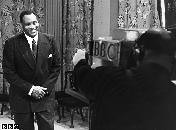By Sean Coughlan
BBC News Magazine
A memorial is being unveiled in London to singer Paul Robeson, blacklisted as "un-American" in the 1950s. Tony Benn, one of the surviving links with a support group in the UK, recalls meeting his hero.
Paul Robeson was one of the world's first musical superstars, his rich, bass voice booming out of wireless sets from Detroit to Dover.
In the late 1930s, UK radio listeners, more used to warblers in dinner jackets, voted this black American their favourite singer.
And performances on Broadway and in Hollywood movies made the son of an escaped slave one of the biggest-selling names in entertainment.
But within a decade, Robeson's left-wing politics had almost erased him from public view in his own country - driven off the airwaves, blocked from performing and barred by record companies.
Such hostility did not face the singer in the UK. In commemoration of his years spent living here, a memorial is being unveiled on Wednesday at the University of London's School of Oriental and African Studies, where he studied.
Last link
Making the speech in honour of Robeson will be one of the last surviving links with the British campaign that supported the blacklisted singer - the veteran politician, Tony Benn.
---------------------------------------------------------
ROBESON'S LIFE
1898: Born New Jersey, son of an escaped slave
Professional football player, paid his way through law school
Starred in Othello on stage and movies including Showboat, singing Old Man River
Performed for left-wing causes in US, USSR and UK
1946: Faced Un-American Activities Committee. Concerts cancelled, barred from TV, recordings banned, passport revoked
1976: After prolonged ill-health, dies in Philadelphia
-------------------------------------------------------
"He was one of the greatest figures of the past century. He stood for everything I believed in," says Benn.
Robeson had a remarkably eclectic career. In the face of raw racial prejudice, he became a famous athlete, lawyer, Shakespearean actor, movie star and singer - and with success at every turn, he could have basked in well-heeled celebrity status.
But instead Robeson became deeply involved in left-wing politics - a path that led him into a grinding battle with the authorities suspicious of his sympathies for the Soviet Union.
This confrontation escalated to the extent that Robeson was blocked from leaving the US. Which is how he met Benn.
"You could take away his passport, but you couldn't take away his voice," says Benn.
In 1957, infuriated by the travel ban on Robeson, Benn helped to organise a protest meeting in Camden. Unable to be there in person, Robeson sang down a phone line to 1,000 supporters crammed into a hall in north London.
"It was only elementary technology, but it was Paul Robeson," says Benn.
And when Robeson's passport was returned, he came to visit Benn and his family at the Houses of Parliament - an encounter that still stands out for the 81-year-old political veteran.
"Robeson was like an electro-magnet going through a pile of iron filings. It wasn't just admiring fans, it was deep admiration... he radiated personality, a man of great commitment and strength... totally immune to the persecution he suffered."
Prompted by Benn's elderly aunt, Robeson sang Old Man River. "The whole tea room went silent, it was the most extraordinary experience."
Treasured memory
Speaking in his west London home, surrounded by shelves spilling over with decades of his diaries, Benn is now a great repository of political memories.
He recalls canvassing as a child in the 1935 election, meeting figures such as Oswald Mosley and Mahatma Gandhi, watching London burn during the Blitz, losing his brother in World War II. "Experience is the only teacher," he says.
But the memory of Robeson still stirs him deeply. When he puts on a video of a scene from Proud Valley, a 1940s Robeson movie set in Wales, he is in tears at the story about overcoming discrimination.
"I was brought up on the Bible like Paul, right and wrong is what it's about. If people are badly treated, you support them. It's easy to make speeches, but the crucial question is whose side are you on when the going gets rough."
He sees Robeson as an example of sticking to beliefs. Whether it was campaigning against lynching in the US or supporting Welsh miners, he backed the underdog.
"What really influenced him was the way his people were treated - it was what gave him his motivation, and his enormous talent gave him an opportunity to get that into the public arena."
"The establishment still distrust him, because he was a socialist and an internationalist, even in death he's still regarded in the United States as a suspect figure," says Benn.
After a five-year stay in the UK, Robeson returned home to relative obscurity and prolonged ill-health, with his reputation only gradually being rehabilitated after his death in 1976.
In terms of Robeson's relevance, Benn says it's the way that the singer connected his own experiences with his beliefs.
Challenged by the Un-American Activities Committee with the blunt question: "Why do you not stay in Russia?" Robeson answered:
"Because my father was a slave, and my people died to build this country and I am going to stay here and have a part of it just like you."
Story from BBC NEWS:
http://news.bbc.co.uk/go/pr/fr//2/hi/uk_news/magazine/5345904.stm
Published: 2006/09/20 09:35:34 GMT

No comments:
Post a Comment